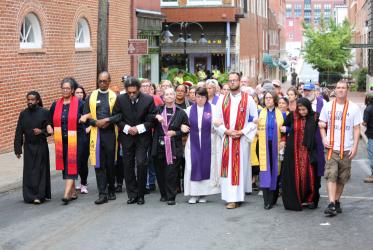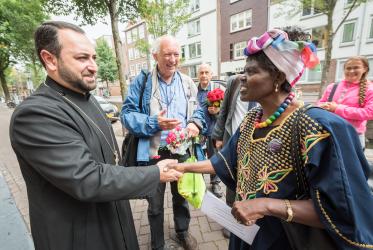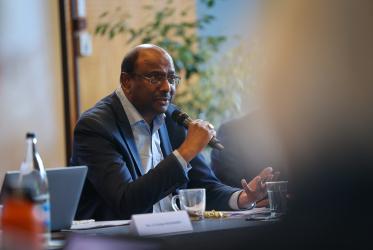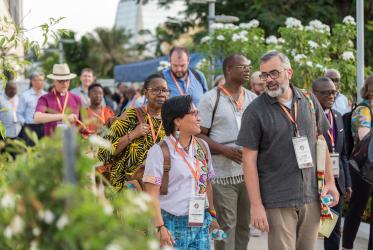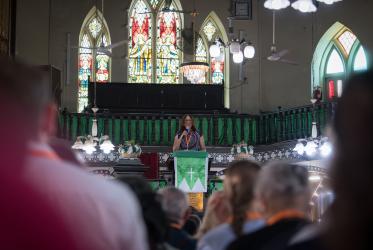The theme was “From Manchester 1945 to a Pan-African Renaissance: The Shared Journey – Past, Present and Future.” Participants and speakers consisted of representatives from the African continent and the African diaspora, that is, from all the regions where people of African descent are found. The regions included Africa, Asia, Europe, the Caribbean, Latin America, North America, and the Pacific.
Rev. Dr Angelique Walker-Smith, a member of the World Council of Churches (WCC) central committee and part of the international leadership team of Africa and Africans in Diaspora (AAD) who organized the conference, said the conference was “groundbreaking” in many ways.
“First and foremost, we come standing on the majestic shoulders of our ancestors who came before us hundreds of years ago,” she said as she opened the conference. “Those who gave their lives for our benefit. The mothers and fathers who stood strong and resilient during horrific periods of struggle but by faith, with boldness and unmitigated courage, lead us and who made it possible, by God’s grace, to bring us thus far.”
Battle against racism not over
Rev. Frank Chikane, moderator of the WCC Commission of the Churches on International Affairs and a member of the AAD international leadership team, said: “Although there have been huge achievements in changing the conditions of Africans and Africans in the diaspora since the 1945 Manchester Pan-African Conference, political developments affecting Africans and people of African descent globally in the last few years suggest that we are not winning the battle against underdevelopment, poverty and the old demon of racism.”
WCC deputy general secretary Prof. Dr Isabel Apawo Phiri offered opening remarks, updating participants on preparations for the WCC 11th Assembly in Karlsruhe, Germany in 2022, as well as plans for a Women’s Pre-Assembly.
“Today’s agenda helps us to highlight the intersection of racism and sexism as we work together to forge a world where all people experience fullness of life,” said Phiri. “The WCC has long recognised the need to highlight this aspect.”
A wide variety of plenary speakers and panelists covered an array of topics over the weeklong conference featured in prior regional and global discussions. A few of those topics included racism, women’s leadership, reparatory justice/reparations and COVID-19.
The conference began with a pre-conference led by the WCC-related Pan African Women’s Ecumenical Empowerment Network (PAWEEN). This pre-conference featured Dr Brigalia Bam, former chairperson of the Independent Electoral Commission of South Africa and former executive programme secretary for the Women’s Department of the WCC. The pre-conference featured “Telling Her Stories: Exploring Women’s Engagement Before and at Manchester, Tanzania and Beyond."
The AAD also featured discussions centered on African spirituality and its role in identity. Prof. Barney Pityana, deputy president of the Academy of Science South Africa and past director of the WCC Programme to Combat Racism, said that African spirituality has filtered into the organized religiosity of our time.
“This conference has the enormous responsibility today of making a distinctive commentary about where Pan Africanism is going in a world that is morally and politically challenged,” said Pityana.
Organizations were also able to explain their roles and brainstorm ways in which to collaborate.
Angela Naa Afoley Odai, acting head of the Diaspora Division at the Directorate of Citizens and Diaspora Organisations of the African Union Commission in Addis Ababa, explained her organization’s many initiatives as well as ones proposed for the future. “A typical example is what I’m doing: currently we are working on the migration policy framework for Africa,” she said. “There are several ways in which we noticed, in our area of work, that diasporas are dong wonderful things--they are doing so many wonderful initiatives but because most of them work in silos, people don't know about them.”
Africanism for all and with all
Mr. H. B. Adédiran Olaiya, M.A., an Inclusive Policy Lab expert with the United Nations Educational, Scientific and Cultural Organization, People of African Descent & the Sustainable Development Goals E-Team and member of the Working Preparatory Group of the New Permanent Forum of People of African Descent said: “It is is important to empower marginalised African diaspora communities through human rights education in the International Decade for People of African Descent and new Permanent Forum of People of African Descent. This conference is a strategic partner in doing this with spiritual, moral and policy perspectives that seek to engage faith communities, civil society, grassroots movements and governance policy leaders.”
Prof. Mzukisi Qobo, head of the Wits School of Governance at the University of the Witwatersrand in South Africa, spoke about the global primacy on economic interests, and how many economic agreements and institutions were set while Africa was still in the grips of colonialism.
“African countries were at the back burner, so at the time they achieved independence in the late 50s, and many of them in the early 60s to the mid 1970s, the agenda in these institutions had been set,” he said. “So If you look at the structure of international economic agreements, the African countries, or Arica, is still at the bottom of the global economic hierarchy.”
In an AAD Manifesto, conference participants adopted 10 Action Steps for going forward. In so doing, conference participants agreed that there cannot be Pan-Africanism which is not Africanism for all and with all. “Pan-Africanism shall engage and include women, youth, the elderly, minorities, and various religious, spiritual, and cultural expressions,” reads the manifesto. “Voices from Indigenous Peoples and of people from Palestine reminded us to collaborate and work together with all people who were oppressed and whose rights were violated to bring about a sustainable transformation in the world with and for all humanity and creation.”

